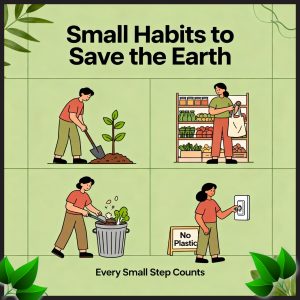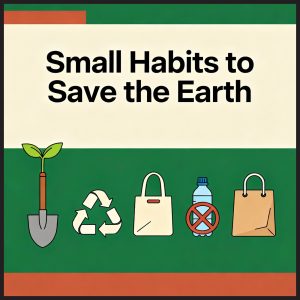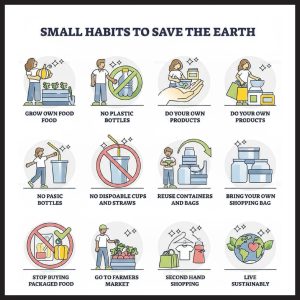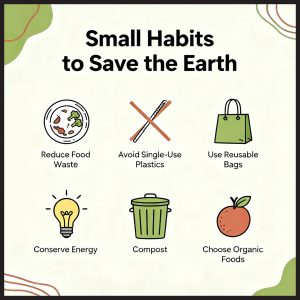Small Habits to Save the Earth
Small Habits to Save the Earth may sound like a simple idea, but it carries immense power. Every day, our smallest actions—how we eat, travel, consume, and dispose—have an impact on the planet. The truth is that climate change, pollution, and resource depletion are not just the results of massive industries or corporations; they are also shaped by the habits of billions of individuals.

When we commit to Small Habits to Save the Earth, we start a ripple effect that multiplies across communities and generations. From conserving water and reducing waste to supporting sustainable brands and practising mindful consumption, every habit plays a vital role in healing our planet. This article dives deep into practical steps that anyone can take to live more sustainably, proving that small acts truly create big change.
The Power of Everyday Choices
The foundation of sustainability begins at home—with awareness and consistency. Practising Small Habits to Save the Earth means transforming ordinary routines into eco-conscious actions. One of the easiest and most effective ways to start is by reducing plastic consumption. Plastic takes hundreds of years to decompose and severely harms marine life. Switching to reusable bags, bottles, and containers dramatically cuts down single-use plastic waste.
Another critical habit is embracing energy conservation. Turn off lights when not in use, unplug electronics, and invest in energy-efficient appliances. Replacing traditional bulbs with LED lights not only saves energy but also reduces your electricity bills. Similarly, walking or cycling instead of driving short distances minimises carbon emissions.
We often underestimate the environmental impact of our diets. By consuming less meat and incorporating more plant-based meals, we can lower methane emissions from livestock and preserve natural habitats used for animal farming. Shopping locally and seasonally also reduces transportation emissions and supports small farmers. These Small Habits to Save the Earth require minimal effort but deliver significant long-term results. The more we make sustainable decisions part of our lifestyle, the closer we get to restoring balance between humanity and nature.
Water, Waste, and Conscious Living
Water is one of the planet’s most precious yet misused resources. Simple adjustments in how we use it can create a huge difference. Installing low-flow showerheads, fixing leaks immediately, and turning off the tap while brushing teeth are effective Small Habits to Save the Earth that conserve thousands of litres of water annually. Collecting rainwater for gardening or cleaning is another environmentally friendly practice that reduces dependency on municipal supplies.
Waste reduction is another key aspect of eco-conscious living. Start by following the “reduce, reuse, recycle” principle. Avoid excessive packaging by purchasing bulk items and bringing your own containers to stores. Composting kitchen scraps and garden waste transforms organic material into nutrient-rich soil, keeping landfills cleaner and supporting natural ecosystems.
Practising mindful consumption—buying only what you need—helps reduce both clutter and environmental stress. Choose durable, high-quality products that last longer instead of fast-fashion or disposable alternatives. Supporting eco-friendly brands that prioritise sustainable materials and ethical labour practices also strengthens a global movement toward greener production.

By applying these Small Habits to Save the Earth, we can reshape our relationship with resources. Conscious living isn’t about perfection—it’s about progress. Every act of conservation, no matter how small, contributes to the preservation of our planet’s most vital systems.
Energy Efficiency and Green Innovation
Modern lifestyles are heavily dependent on energy, but much of it still comes from non-renewable sources. Implementing Small Habits to save the Earth through energy management can significantly reduce our collective carbon footprint. Begin by maximising natural light during the day, keeping curtains open, and using reflective colours for interiors. This simple approach reduces reliance on artificial lighting and lowers electricity use.
For heating and cooling, proper insulation plays a crucial role. Sealing windows, doors, and ducts helps maintain comfortable indoor temperatures without overusing air conditioners or heaters. Switching to smart thermostats and timers ensures that energy is used only when necessary. These practical habits save both the planet and your finances.
Another meaningful shift comes from transitioning toward renewable energy sources. Solar panels are becoming increasingly affordable for residential use, allowing households to generate their own clean power. Even small-scale renewable systems make a considerable impact. Supporting community wind or solar projects is another way to contribute to sustainable energy development.
Additionally, choosing energy-efficient transportation is one of the most effective Small Habits to Save the Earth. Using public transport, carpooling, or switching to electric vehicles reduces fossil fuel dependency. These small but consistent choices foster a culture of responsibility and pave the way for a cleaner, greener energy future.
Sustainable Eating and Responsible Consumption
Food production and consumption are deeply tied to environmental health. By changing our eating habits, we can directly influence the planet’s sustainability. Practising small Habits to save the Earth through sustainable eating starts with cutting down on food waste. Plan meals, store food properly, and use leftovers creatively. Globally, nearly one-third of all food produced is wasted, contributing to methane emissions from landfills.
Supporting organic farming and buying from local markets not only ensures fresher produce but also reduces the carbon footprint caused by long-distance transportation. Organic farming avoids synthetic pesticides and fertilisers, preserving soil fertility and promoting biodiversity.
Another impactful step is embracing plant-based diets. Even reducing meat consumption by a few meals a week can significantly lower greenhouse gas emissions. Growing your own vegetables or herbs at home is both rewarding and sustainable. Gardening connects you with nature and provides a direct reminder of the resources that nourish us.
When dining out, support restaurants that use locally sourced and seasonal ingredients. Avoid single-use plastics such as straws and cutlery. These seemingly minor decisions embody Small Habits to Save the Earth that collectively create meaningful global change. Responsible consumption goes beyond what we eat—it’s about appreciating where our food comes from and how our choices affect the planet.
Eco-Friendly Homes and Green Spaces
Your home can be a powerful place to start adopting Small Habits to Save the Earth. Begin with simple improvements that make your living space more sustainable. Using eco-friendly cleaning products eliminates harmful chemicals that contaminate water systems. Replacing paper towels with reusable cloths or microfiber alternatives reduces waste.
Another essential step is managing temperature efficiently. In the summer, use fans instead of air conditioners where possible; in winter, wear layered clothing before turning up the heat. Planting indoor greenery not only enhances air quality but also creates a calming environment.
Creating green spaces around your home—such as planting trees, flowers, or vegetables—helps absorb carbon dioxide, supports wildlife, and beautifies neighbourhoods. Trees provide shade, improve oxygen levels, and contribute to biodiversity.
If you live in an apartment, small balcony gardens or vertical planters can make a difference. Encouraging community gardening or supporting local tree-planting drives spreads environmental awareness and fosters unity. Even simple acts like recycling rainwater, composting, or switching to solar lighting can significantly reduce environmental stress.
Through these Small Habits to Save the Earth, we transform our homes into living symbols of sustainability—spaces that nurture both our well-being and the planet’s.
Sustainable Fashion and Conscious Choices
Fashion is one of the most polluting industries on the planet, yet it’s also an area where Small Habits to Save the Earth can thrive. The fast-fashion model encourages overconsumption and produces enormous textile waste. To counter this, start by buying fewer but better-quality clothes made from natural fibres like cotton, hemp, or bamboo. These materials are biodegradable and require fewer chemicals during production.
Thrifting and buying second-hand clothing is another environmentally conscious decision. It reduces demand for new production while giving pre-loved items a second life. You can also upcycle old clothes into new fashion pieces or home items like cleaning cloths or tote bags.
Washing clothes in cold water saves energy and prolongs fabric life, while air drying instead of machine drying conserves electricity. Supporting ethical brands that ensure fair wages, safe working conditions, and sustainable manufacturing methods reinforces the global transition to responsible fashion.
By adopting these habits, consumers send a clear message to brands that sustainability matters. Small Habits to Save the Earth in fashion show that style and responsibility can coexist beautifully. Every purchase becomes a vote for a cleaner, fairer world.
Transportation and Travel Ethics
Our travel and transportation choices play a massive role in shaping environmental outcomes. Embracing Small Habits to Save the Earth in mobility doesn’t mean giving up convenience—it means being smarter about how we move. Walking, cycling, or using public transit are excellent ways to minimise personal emissions.
For longer trips, carpooling reduces the number of vehicles on the road, cutting fuel consumption and pollution. Choosing fuel-efficient or electric vehicles further enhances sustainability. When flying, consider purchasing carbon offsets to balance emissions. Some airlines and organisations invest in tree-planting or renewable energy projects that neutralise your travel footprint.

Vacationing closer to home or choosing eco-tourism destinations that support conservation efforts can also help protect natural habitats. Travelling with a reusable water bottle, utensils, and a shopping bag prevents plastic waste. These are practical, achievable Small Habits to Save the Earth that make global exploration more responsible and fulfilling.
Sustainable travel isn’t just about reducing harm; it’s about creating positive impact. Supporting local businesses, respecting wildlife, and minimising resource use are powerful ways to give back to the communities and ecosystems you visit.
Technology and Digital Sustainability
In today’s digital era, even our online activities have environmental consequences. Data centres that power the internet consume vast amounts of electricity. Implementing Small Habits to save the Earth in technology usage can make a surprising difference. Start by turning off devices when not in use and avoiding unnecessary cloud storage, which demands high energy for maintenance.
Using energy-saving modes on phones, computers, and televisions reduces power consumption. Opt for digital receipts and online statements instead of printed copies to minimise paper waste. Additionally, recycling old gadgets responsibly prevents hazardous materials like lead and mercury from polluting soil and water.
Switching to green web hosting services—companies that run their servers on renewable energy—is another impactful choice for entrepreneurs and website owners. Supporting technological innovations that promote efficiency, such as smart home systems or eco-friendly apps, empowers us to live sustainably in a connected world.
These Small Habits to Save the Earth in the digital realm demonstrate that sustainability extends beyond physical actions—it includes how we use and interact with technology daily.
The Ripple Effect of Small Actions
The beauty of Small Habits to Save the Earth lies in their cumulative effect. When millions of people commit to small eco-friendly steps, the combined outcome is transformative. For instance, if every household switched to LED bulbs, the global reduction in energy consumption would rival the output of several power plants. Similarly, if everyone reduced single-use plastic by half, marine pollution could drop dramatically within a decade.
Encouraging family, friends, and communities to join in magnifies the impact. Teaching children to care for nature instils lifelong environmental values. Schools, workplaces, and public spaces can adopt eco-initiatives such as recycling drives, community gardens, and awareness programs.
The path to sustainability doesn’t demand perfection—it requires persistence. Every mindful choice counts, whether it’s carrying a reusable bag, conserving water, or planting a tree. These actions inspire others and create an unbreakable chain of change. The earth doesn’t need a handful of people living perfectly sustainably—it needs billions doing it imperfectly but consistently.
Conclusion
Embracing Small Habits to Save the Earth is not about grand gestures but about steady, conscious choices. Each action—turning off a light, avoiding plastic, choosing public transport, or supporting ethical brands—contributes to the preservation of our environment. Sustainability begins with awareness and flourishes through routine.

Our planet is resilient, but it needs our cooperation to heal. The time to act is now, not through fear but through responsibility and hope. When we adopt Small Habits to Save the Earth, we nurture a culture of care, proving that individual actions can indeed change the world. Together, our small habits form the foundation of a greener, healthier, and more harmonious planet for generations to come.
